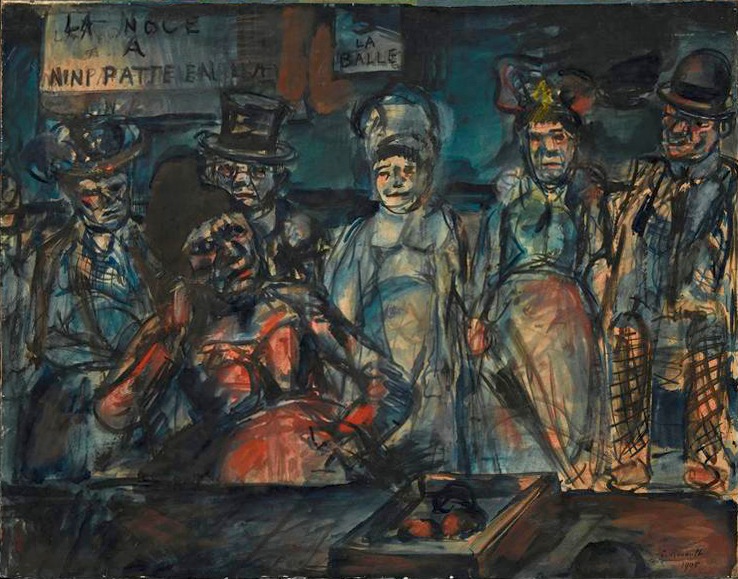92 and Not Dead Yet
A Revolting Peasant Crushed
by Reg Green (August 2021)
 Jeu de massacre, Georges Rouault, 1905
Jeu de massacre, Georges Rouault, 1905
Planning a trip recently, I noticed that on Mondays the schedule was different from other days. No big deal but it reminded me of a story Eric Hobsbawm told me when he was my tutor at London’s Birkbeck College in the 1960s that has not only given me pleasure over the years but one I was able to steal satisfyingly.
Although he was then well on the way to becoming what a New Yorker contributor called “perhaps the world’s most renowned historian” and the most stimulating history teacher most of his students ever had, I was on easier terms with him than the usual professor-student relationship because I was already covering the same jazz concerts for the Daily Telegraph as he was for the New Statesman and, since his reviews always sounded much more learned than mine, he liked the common interest but didn’t have to worry about the competition.
One day he mentioned he was going to spend part of his summer vacation in Basilicata, in the south of Italy, because he was writing a paper on 16th century peasant revolts and had been advised that contemporary social conditions there were closer to those in the 16th century than anywhere else in Europe.
“We’re going to take you to some of the key people so you can ask them whatever you want ,” the Italian Communist who had approved his visit told him. “But if we tell them you are a university lecturer they will think you’re from the CIA so instead we’ve told them you are a lawyer from Florence who is trying to help them.”
“How can we say that?” Hobsbawm asked. “I don’t speak Italian.”
“How the hell do they know what language they speak in Florence?” his fixer replied.
I kept the story warm in my memory for twenty years until one Monday revisiting England on vacation—I grew up in Manchester—my wife and I went to an obscure castle in the south, having forgotten that on Mondays every museum in Europe, every historical curiosity, every natural beauty spot that can be cordoned off was closed.
No one was at the entrance, however, so I said, “Let’s go in and if anyone stops us we’ll tell them we’ve come all the way from Los Angeles.”
“How can we do that, with a North of England voice like yours?” Maggie asked.
My reply was preordained, “How the hell do they know what language they speak in—?”
“—California,” she interrupted, knowing the Hobsbawm story.
“No, Manchester,” I said.
***
P.S. When I say our relationship was easier, that wasn’t saying much. One day in a tutorial with half a dozen other students, I ventured to make an observation that I thought added perspective to a comment he’d made. “Prussia? In the 17th century?” he pondered, drawing it out. “Almost certainly (I basked in his approval, he was not given to praise) not.”
___________________________
Reg Green is an economics journalist who was born in England and worked for the Daily Telegraph, The Guardian and The Times of London. He emigrated to the US in 1970 .
His life changed course in 1994 when his seven-year old son, Nicholas, was shot in an attempted robbery while on a family vacation in Italy. He and his wife, Maggie, donated Nicholas’ organs and corneas to seven Italians, a decison that stimulated organ donation around the world and is known as “The Nicholas Effect.” Reg wrote a book, also called The Nicholas Effect, which was the basis of the television movie, “Nicholas’ Gift,” starring Alan Bates and Jamie Lee Curtis. At 92, he continues to work full-time to bring attention to the hundreds of thousands of lives that have been lost because of the shortage of donated organs.
Follow NER on Twitter @NERIconoclast